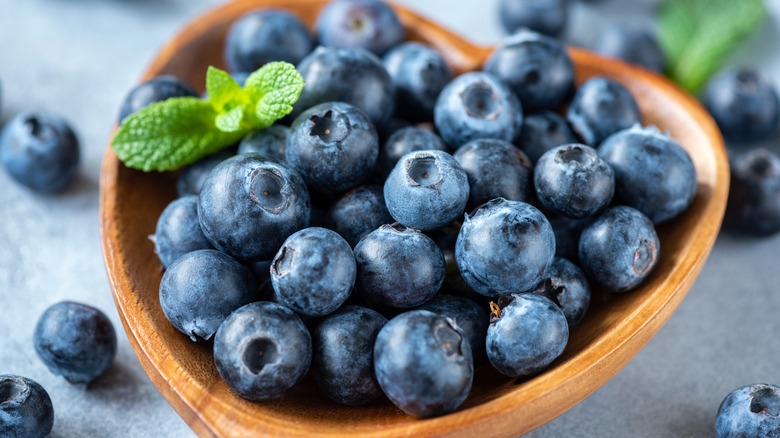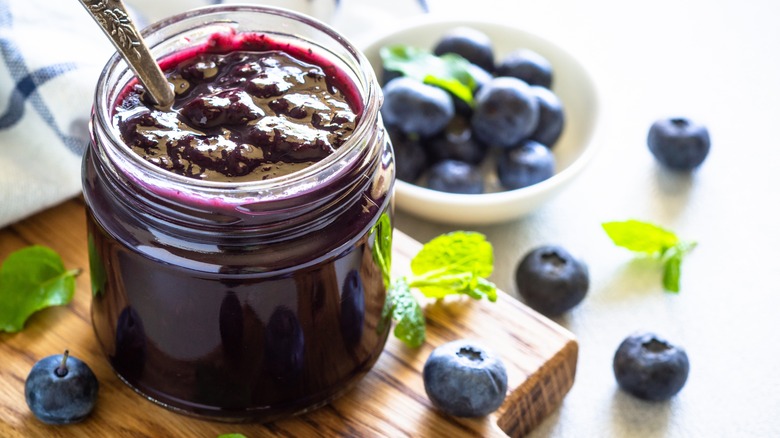When You Eat Too Many Blueberries, This Is What Happens
Packed with antioxidants, blueberries offer both flavor and nutrition. A one-cup serving has just 84 calories and 3.6 grams of fiber, reports My Food Data. It also offers 16% of the recommended daily vitamin C intake, 24% of the recommended daily amount of vitamin K, and 22% of the recommended daily allowance of manganese. These tiny fruits are also rich in phenolic acids, quercetin, anthocyanidins, and other compounds with antioxidant activity (via the Journal of Zhejiang University Science B). The question is, what happens when you eat too many blueberries?
Most fruits, including blueberries, are relatively high in fiber. When consumed in excess, this nutrient may cause bloating, gas, diarrhea, and mineral deficiencies, warns Duke University. Generally, women should not exceed 25 grams of dietary fiber per day. Men, on the other hand, should aim for about 38 grams per day. While it's unlikely to get too much fiber from blueberries alone, you may feel bloated after eating three or four cups of berries — especially if you increase your fiber intake too quickly.
Even the healthiest foods can be harmful when consumed in large amounts. Blueberries are no exception. Here's what you should know about their potential side effects.
Blueberries can trigger allergies
Blueberries contain certain allergens that could potentially cause unpleasant side effects. According to Allergy Resources, blueberries have lipid transfer proteins that can trigger an allergic reaction. These proteins are found in the skin or seeds of foods, and the digestive system is not able to break them down, per Allergy UK. Symptoms of a lipid transfer protein allergy may include swelling of the face, stomachache, vomiting, trouble breathing, and a rash.
Blueberries are also high in salicylates with 27.6 milligrams of salicylates per 100 grams, according to Family Medicine Austin. Salicylates occur naturally in a wide range of fruits, vegetables, and spices, and you'll find synthetic versions in some pain relievers and products like shaving creams, sunscreens, and mouthwashes. People who are sensitive or allergic to salicylates may experience a variety of symptoms including rashes, headaches, diarrhea, stomach pain, hives, inflammation, and more (via WebMD). If you're allergic or sensitive to these compounds, you may still be able to eat blueberries in small amounts, per Family Medicine Austin.
Too many blueberries can interfere or interact with medication
As previously mentioned, blueberries provide 24% of the daily recommended intake of vitamin K per cup. This fat-soluble nutrient supports blood clotting and bone health, according to Oregon State University. The problem is that it can interact with warfarin and other blood thinners, leading to an increased risk of bleeding. People who take blood thinners should not exceed the recommended daily amount of vitamin K, which is 90 micrograms for adult women and 120 micrograms for men. They also need to avoid large variations in their daily vitamin K intake.
Because blueberries could lower blood sugar levels, the National Library of Medicine says this might cause your blood sugar to drop too low if you're taking diabetes medication. Therefore, you should keep an eye on your blood sugar levels if you eat a lot of blueberries. Apart from these instances, eating too many blueberries is unlikely to cause major issues.
Impact on blood sugar and triglycerides
Blueberries boast over 21 grams of carbs, including 14.7 grams of sugar per cup. However, the bulk of the sugars in blueberries are glucose and fructose, both of which are monosaccharides, although they are each processed differently in the body. Glucose raises blood sugar more quickly, while fructose gradually increases blood sugar and has less of an impact on insulin levels, per Healthline. Notably, berries also contain anthocyanins, which have been found to help reduce blood sugar levels after starchy meals, according to a 2005 review in BioFactors.
However, a 2015 review from the Journal of the American Heart Association found that if adding more fructose to your diet means going more than 20% of your daily calorie needs, you could wind up increasing your blood triglycerides, which could negatively impact your heart health. The U.S. Department of Agriculture recommends about 1 ½ to 2 cups of fruits per day for adult women and 2 to 2½ cups per day for adult men. Eating blueberries every day can make it easier to get more vitamins, minerals, and antioxidants into your diet — just make sure you don't go overboard.




